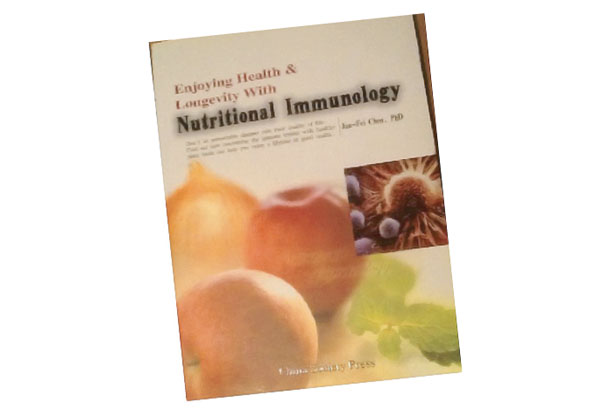
Yes, there’s a doctor in the house, Dr. Jau-Fei Chen, but she believes that we don’t have to look far because the best doctor in the world can be found within us our immune system. And a healthy and well-cared-for immune system is the key to effectively preventing illnesses.
Dr. Chen has made a name for herself in the field of nutritional immunology not in Taiwan, where she was born, but in the US, where her work in disease prevention has been widely recognized.
Nutritional immunology? Now, that’s a mouthful!
Dr. Chen explains, “Nutritional immunology is a science that studies the link between nutrition and the immune system. According to nutritional immunology, nutrient-rich foods contribute to a strong immune response, which in turn neutralizes disease-causing germs and prevents infections. Similarly, when we are ill, such foods will help us to recover faster.”
She notes that while many take the effort to eat nutritiously when they’re (already) sick, only a few take precautions, which could have prevented the illness in the first place.
Really now, Dr. Chen’s health prescription is simply this: Prevent disease and you don’t have to worry about curing it.
Dr. Chen defines the immune system as an amazing “proactive defender.”
In short, the secret to long life is to boost our immune system. And we can do this by eating a large variety of plant foods, which aid digestion and flush out toxins. On the other hand, “consuming too many animal products and high-fat foods will impair immunity, leaving us in a tired, lethargic state.”
A healthier diet = a better life. Dr. Chen arms us with more nutritional wisdom in this Q & A from her book Enjoying Health & Longevity with Nutritional Immunology.
What are some of the plant foods that are rich in antioxidants, phytochemicals, and polysaccharides that help prevent cancer?
Among the nutrient powerhouses are:
• Antioxidants — grape seed, cactus fruit, ginseng berry, rose, five leaf ginseng, and citrus.
• Phytochemicals — soy, cactus, broccoli, cauliflower, ginseng berry, chrysanthemum, cassia tora, mulberry leaf, and sophora bean.
• Polysaccharides — pearl, mushrooms like shiitake, reishi, maitake, coriolus versicolor, and agaricus blazel murill.
Can fish oil supplements prevent cancer?
So far, research has only shown the beneficial effects of omega-3 fatty acids from natural fish sources. Research has not yet demonstrated any possible benefit from taking fish oil supplements.
If I have a genetic risk of cancer, is it too late for me to prevent it?
Cancer is caused when our cells mutate ... Nutrition cannot change our genes. But by eating healthy, we can prevent genetic illnesses from being triggered, help control the illness or reduce the symptoms. The American Cancer Society advises that certain nutrients may protect our cells from mutating or becoming damaged. Physical activity and weight control may also delay or prevent the development of cancer in people with increased genetic risk.
Can I get cancer if I am overweight?
The American Cancer Society says that being overweight or obese can increase the risk of breast cancer among post-menopausal women and some other cancers such as those of the colon, gallbladder, and kidney.
The American Heart Association reports that people who are more than 30 percent over their ideal body weight are more likely to develop heart disease even if they have no other risk factors like smoking and diabetes. This is because the extra weight puts a strain on the heart and increases blood pressure and cholesterol.
Should I avoid preserved meats?
Experts say this could be due to nitrites, which are added to many preserved meats to maintain their color and prevent contamination with bacteria. Nitrites can be converted in the stomach to carcinogenic nitrosamines, which may increase the risk of stomach cancer.
Diets high in vegetables and fruits that contain vitamin C and phytochemicals retard the transformation of nitrites to nitrosamines.
Is it true that cooking meat or boiling milk can be harmful?
Cooking and heating are actually necessary to remove harmful germs from meat and milk. However, research suggests that frying, broiling, or grilling meats at very high temperatures creates chemicals that might increase cancer risk. Experts say that the process of pasteurizing milk not only removes germs but also detroys milk’s natural enzymes and alters its delicate proteins, causing human-like chronic illnesses and even stillbirth in lab animals.
How much water and other fluids should I drink?
The American Cancer Society suggests that drinking water and other liquids may reduce the risk of bladder cancer as the water dilutes the concentration of carcinogens and shortens the time in which they are in contact with the bladder lining. Although drinking eight cups of water a day is recommended, theAmerican Journal of Physiology reports that the actual requirement for each individual can differ. Too much water may become burdensome and lead to water intoxication, where the kidney cannot keep pace with the fluid intake.
Are there nutrients that are only found in animal products and not plant foods?
All the nutrients needed to support and enhance our immune functions are readily found in plant foods.
Does “natural” equal “healthy”?
No, not everything natural is healthy. For example, herbs are divided into food herbs and medicinal herbs. Medicinal herbs cause side effects while food herbs don’t. The compound ephedrine, from the herb ephedra, can cause brain hemorrhage in serious cases. Cocaine and tobacco are other examples of natural herbs that can cause harmful side effects. Experts also say that some herbs, although natural, can cause adverse effects when taken with certain prescription or over-the-counter drugs.




No comments:
Post a Comment